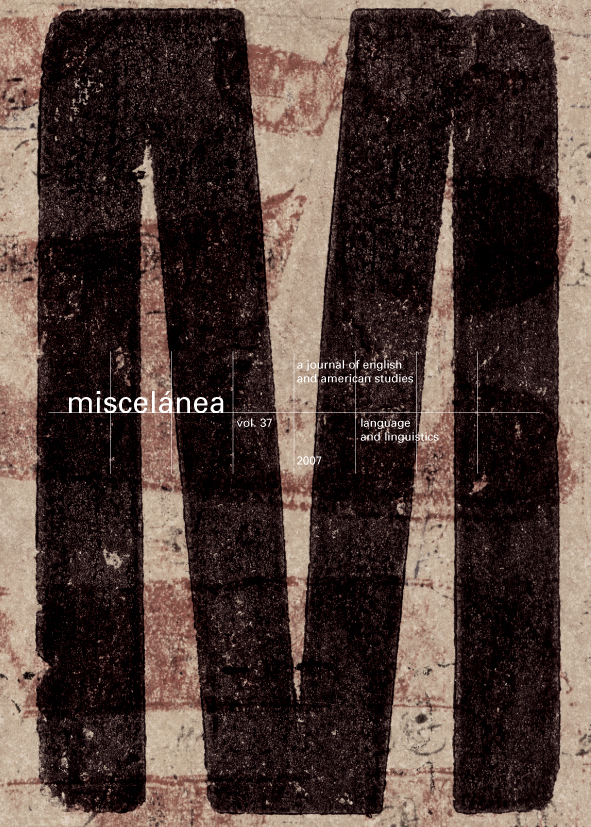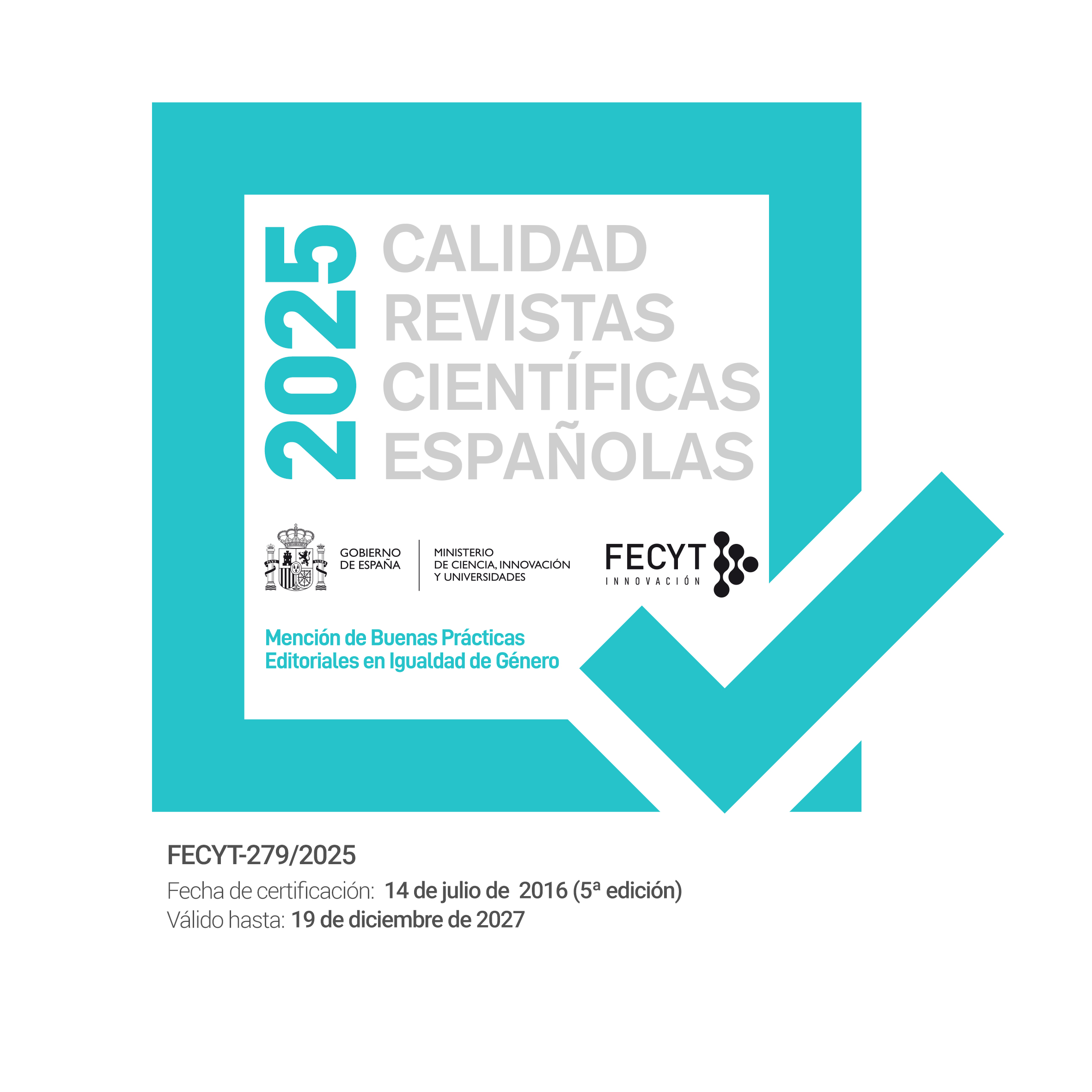Transfer and Universal Grammar in Unaccusative Constructions Errors
DOI:
https://doi.org/10.26754/ojs_misc/mj.20089705Keywords:
developmental errors, unaccusative predicates, expletive pronouns, language transfer, Universal GrammarAbstract
Common errors are examined in subject expletive pronouns use with unaccusative predicates in the written production of Spanish high-intermediate adult students of English as a Foreign Language (EFL) in an institutional setting. What these errors have in common is that they do not respond to L1 surface transfer in the sense of not corresponding to a mere L2 relexification of L1 syntax. They rather involve a process of construction of the L2 grammar which results in structures different from both the L1 and the L2. It is suggested and argued that they originate in the interaction of Universal Grammar principles and both L1 and L2 influence in a restructuring process of the L1. As these errors seem to be developmental - since they are also made by L2 students from other L1s, some cognitive strategies are suggested in order to help in the production of standard surface structures.
Downloads
References
Alexiadou, A. and E. Anagnostopoulou. 1998. “Parameterizing AGR: Word Order, V-movement and EPP Checking”. Natural Language and Linguistic Theory, 16: 491-539.
Burzio, L. 1986. Italian Syntax: A Government and Binding Approach. Dordrecht: Reidel.
Corder, S. 1967. “The Significance of Learners’ Errors”. International Review of Applied Linguistics, 5: 161-167.
Chompsky, N. 1981. Lectures on Government and Binding. Dordrecht: Foris.
—. 1986. Barriers. Cambridge, Massachussetts: Massachussetts Institute of Technology Press.
—. 1995. The Minimalist Program. Cambridge, Massachussetts: Massachussetts Institute of Technology Press.
—. 2000. “Minimalist Inquiries: The Framework”. In Martin R, D. Michaels & J. Uriagereka (eds.) Step by step: Essays on Minimalist Syntax in honor of Howard Lasnik. Cambridge, MA: MIT Press: 89–155.
—. 2001a. “Beyond Explanatory Adequacy”. MIT Occasional Papers in Linguistics, 20: 1-28.
—. 2001b. “Derivation by Phase”. In Kenstowicz, M. (ed.) Ken Hale: A Life in Language. Cambridge, MA: MIT Press: 1-52.
Dowty, D. 1991. “Thematic Proto-roles and Argument Selection”. Language, 67: 547-619.
Escutia, M. 2002. “First Language Effect on Spanish Learners’ Production of Indirect Interrogative Clauses”. Círculo, 10: 1-5. Available at http://ww.ucm.es/info/circulo/no10/index.htm
Flynn, S. 1987: “Contrast and Construction in a Parameter Setting Model of L2 Acquisition”. Language Learning, 37: 19-62.
Gass, S. M., and E. Varoni. 1994. “Input, Interaction, and Second Language Production”. Studies in Second Language Acquisition, 16: 283-302.
Grimshaw, J. 1990. Argument Structure. Cambridge, Massachussetts: Massachusetts Institute of Technology Press.
Hirakawa, M. 1995. “L2 Acquisition of English Unaccusative Constructions”. In MacClaughlin, D. and S. McEwen (eds.) Proceedings of the 19th Boston University Conference on Language Development, 1. Somerville: Cascadilla: 291-303.
—. 2001. “L2 Acquisition of Japanese Unaccusative Verbs”. Studies in Second Language Acquisition, 23: 221-245.
Jackendoff, R. 1990. Semantic Structures. Cambridge, Massachussetts: Massachusetts Institute of Technology Press.
Lavob, W. 1969. “The Logic of Non-standard English”. Georgetown Monographs on Language and Linguistics, 22: 1-31.
Levin, B. and M. Rappaport-Hovav. 1995: Unaccusativity: At the Lexical Syntax-Semantics Interface. Cambridge, Massachussetts: Massachussetts Institute of Technology Press.
Liceras, J. 1996. La Adquisición de las Lenguas Segundas y la Gramática Universal. Madrid: Síntesis.
Liceras, J. M., L. Díaz, D. Maxwell, B. Laguardia and R. Fernández. 1997. “A Longitudinal Study of Spanish Non-native Grammars: Beyond Parameters”. In Pérez-Leroux, A. T. and W. R. Glass (eds.) Contemporary Perspectives on the Acquisition of Spanish, 1: Developing Grammars. Somerville: Cascadilla: 99-132.
Long, M. 1996. “The Role of Linguistic Environment in Second Language Acquisition”. In Ritchie, W.C. & B. K. Bahtia (eds.) Handbook of Second Language Acquisition. New York: Academic Press: 413-468.
Montrul, S. 2004. The Acquisition of Spanish. Morphosyntactic Development in Monolingual and Bilingual L1 Acquisition and Adult L2 Acquisition. Amsterdam: John Benjamins.
—. 2005. “On Knowledge and Development of Unaccusativity in Spanish L2 Acquisition”. Linguistics, 43 (6): 1153–1190.
Oshita, H. 2000. “’What is Happened’ May not Be What Appears to be Happening: A Corpus Study of Passive Unaccusatives in L2 English”. Second Language Research, 16: 293-324.
—. 2001. “The Unaccusative Trap in Second Language Acquisition”. Studies in Second Language Acquisition, 23: 279-304.
Perlmutter, D. 1978. “Impersonal Passives and the Unaccusative Hypothesis”. Proceedings of the Fourth Annual Meeting of the Berkeley Linguistic Society. University of California at Berkeley: 175-189.
Phinney, M. 1987. “The pro-drop parameter in second language acquisition”. In Roeper, T. and E. Williams (eds.) Parameter setting. Dordrecht: Reidel: 221-246.
Quirk, R., S. Greenbaum, G. Leech, and J. Svartvik. 1985. A Comprehensive Grammar of the English Language. London: Longman.
Radford, A. 2004. Minimalist Syntax. Exploring the Structure of English. Cambridge: Cambridge U. P.
Rizzi, L. 1982. Italian Syntax. Dordrecht: Foris.
—. 1990. Relativized Minimality. Cambridge, Massachussetts: Massachussetts Institute of Technology Press.
Rutherford, W. 1989. “Interlanguage and Pragmatic Word Order”. In Gass, S. and J. Schachter (eds.) Linguistic Perspectives on Second Language Acquisition. Cambridge: Cambridge U. P.: 109-133.
Schwartz D. and R. Sprouse. 1994. “Word Order and Nominative Case in Non-native Language Acquisition: A Longitudinal Study of (L1 Turkish) German Interlanguage”. In Hoekstra, T. and B. D. Schwartz (eds.) Language Acquisition Studies in Generative Grammar. Amsterdam: John Benjamins: 317-68.
—. 1996. “L2 Cognitive States and the Full Transfer/Full Access Model”. Second Language Research, 12: 40-72.
Selinker, L. 1972. “Interlanguage”. International Review of Applied Linguistics, 10: 219-231.
Smith, N. and I. M. Tsimpli. 1995. The Mind of a Savant. Oxford: Blackwell.
Sorace, A. 1993. “Incomplete vs. Divergent Representations of Unaccusativity in Nearnative Grammars of Italian”. Second Language Research, 9: 22-48.
—. 1995. “Acquiring Linking Rules and Argument Structures in a Second Language: The Unaccusative/Unergative Distinction”. In Eubank, L., L. Selinker and M. Sharwood-Smith (eds.) Current Trends in Interlanguage. Amsterdam/Philadelphia. PA: John Benjamins: 153-176.
—. 2000. “Gradients in Auxiliary Selection with Intransitive Verbs”. Language, 76: 859-890.
Sorace, A. and Y. Shomura. 2001. “Lexical Constraints on the Acquisition of Split Intransitivity”. Studies in Second Language Acquisition, 23: 247-278.
Strozer, J. 1992. “Non-native Language Acquisition from a Principles and Parameters Perspective”. In Campos, H. and F. Martínez-Gil (eds.) Current Studies in Spanish Linguistics. Washington: Georgetown University Press.
Trahey, M. and L. White. 1993. “Positive Evidence and Pre-emption in the Second Language Classroom”. Studies in Second Language Acquisition, 15: 181-204.
Thackeray, W. M. 1848. Vanity Fair. A Novel Without a Hero. London and Glasgow: Collins’ Clear-Type.
Van Valin, R. and R. Lapolla. 1997. Syntax: Structure, Meaning and Function. Cambridge: Cambridge U. P.
Vergnaud, J. R. 1985. Dépendance et Niveaux de Représentation en Syntaxe. Amsterdam: John Benjamins.
White, L. 1985. “The ‘pro-drop’ Parameter in Adult second Language Acquisition”. Language Learning, 35: 47-62.
—. 1988. “Implications of Learnability Theories for Second Language Learning and Teaching”. McGill Working Papers in Linguistics = Cahiers Linguistiques de McGill, 5: 148-162.
—.1991. “Adverb Placement in Second Language Acquisition: Some Effects of Positive and Negative Evidence in the Classroom”. Second Language Research, 7: 133-61.
—. 2003. Second Language Acquisition and Universal Grammar. Cambridge: Cambridge U. P.
Zobl, H. 1989. “Canonical TYPOLOGICAL Structures and Ergativity in English L2 Acquisition”. In Gass, S. and J. Schachter (eds.) Contemporary Perspectives on the Acquisition of Spanish, 1: Developing Grammars. Cambridge: Cambridge U.P.: 109-133.
Downloads
Published
Issue
Section
License
Copyright (c) 2008 Marciano Escutia

This work is licensed under a Creative Commons Attribution-NonCommercial 4.0 International License.


